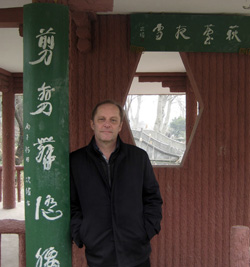By Matt Cutugno
Nanjing, China

Matt Cutugno - Nanjing
|
A travel brochure could well describe China, Zhōngguó in Mandarin, as “mysterious.” This might refer to images of endless tracts of mist-shrouded rolling hills and farmlands, impossibly busy city streets, or perhaps, the hidden secrets of seven thousand years of human history.
I know of another mysterious aspect of China - the eyes of its government peering into the lives of each person here - citizen and visitor alike.
I am living in Nanjing, working as a tutor, and I have visited and worked in The Middle Kingdom many times over the past ten years, but I have never felt those eyes upon me as intently as I do now.
The most obvious example manifests itself in how internet service is monitored. China’s fear of the internet reminds me of a sensitive young man on prom night: nervous and fidgety, sure that something is not right and will likely go terribly wrong
Facebook is inaccessible here in Zhōngguó, as is YouTube. Apparently Microsoft and its site, MSN, have done something to offend the Chinese because its email service (which I use) is intermittent. Google is accessible, but one must be mindful of what one searches for. You can research “human rights abuses,” but if you add “in China” to the query, you will get the omnipresent screen announcing “Internet Explorer Cannot Display the Webpage.”
One can bypass restrictions on Facebook and YouTube by paying a monthly fee (around $12) to any of several companies that operate in China for that purpose. Of course the Chinese government knows of such operations, so apparently their principles in restricting sites are subject to capitalist notions.

Matt Cutugno with Black Swan's Egg, Nanjing
|
Yahoo works very well in China, which might seem like happy news. But Yahoo’s easy access has been traced to its willingness a few years back to supply the Chinese government with the IP address of a man who anonymously criticized the powers that be. The man, journalist Shi Tang, is still in prison, some say to the shame of Yahoo. Yahoo has reconciled its services to the Chinese government’s policies. Its reward, it seems, is unfettered operation of its site.
The aforementioned eyes of what I might call gē ge (Big Brother) do not only gaze upon the internet. Last week I was in Xiamen, a pleasant city on the Taiwan Strait. My hotel had some American stations on its TV, so I tuned into CNN. It just happened that a story was being broadcast about Ai Weiwei, the prominent Chinese artist and architect who had recently been arrested.
Suddenly, the TV in my room shut off. I looked at the controller on the bed next to me, and assumed I had somehow hit it and inadvertently switched off the television. I turned it back on to CNN. I watched the story of the jailed dissident for a few moments more when the set went off again.
When I turned it back on, I viewed a CCTV (Chinese) program, then ESPN, a sports channel, and the TV stayed on. When, for a third time, I tried to watch CNN’s program on Ai Weiwei, the screen again clicked to black.
To think that the government was monitoring my hotel room television sounds like paranoia on my part. However, I told a young Chinese friend of mine in Nanjing the story, and he was curious. He began to write an email to a few classmates, telling them of my experience, and asking their opinion.
Later in the day, when he went to work on the email again and to send it, he found it had disappeared from his draft folder. It had been deleted.
As the travel brochure might say - Mysterious.
Matt Cutugno is the author of The Winter Barbeque.

